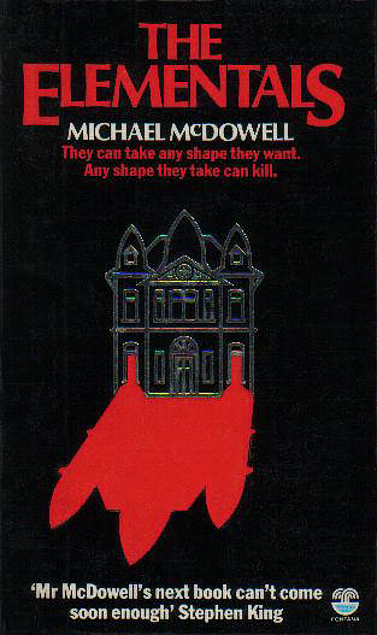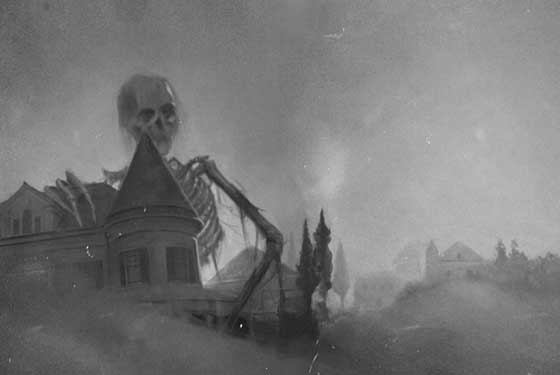
Horror virtuoso Michael McDowell discards the gloomy norms of haunted house literature and sets this masterpiece along sandy shores of the sunny Gulf Coast. With sparkling waves at their doorstep and tanning oil on their pale skin, an exceedingly wealthy southern family relax in isolation at their Victorian beach houses over the summer. The respite is much-needed after the death–and bizarre funeral—of a detestable family matriarch.
One of the vacant beach houses is infested with a nasty spirit. Something that’s not quite ghost, not quite monster, but capable of physical manifestation and elemental manipulation. The family had suspicions about the house for years. Rather than do anything about it, however, they’ve elected to let it become overtaken by sand dunes and fall into ruin. Until this year, that is, when thirteen-year-old India is unable to resist her curiosity.
It’s a testament to McDowell’s talent that the supernatural creature is not even the most bizarre thing about this plot. As an Alabama native himself, it’s clear his authorial eye has always been intrigued by the incestuous culture of wealthy southern families. This theme is explored at great depth in his 1,000+ page epic Blackwater (1983), but this short novel has plenty to say as well.
Many of the best moments include no horror at all, but are mere depictions of this family living their unusual lives. The funeral scene should be considered for the greatest opening chapter of all time, and everything that follows maintains that bizarre energy.
The father-daughter relationship of Luker and India is relentlessly fascinating. She’s a mature thirteen years and flirty toward her father, who’s flirty back. It’s certainly weird, but McDowell doesn’t seem to be suggesting that there’s outright abuse going on. Yes, the father likes taking semi-inappropriate photographs of her and has no problem giving her alcohol, but she’s fully in control and their relationship is meant to be seen, I think, as a minor escalation from what is “normal” southern behavior. Luker’s own mother, for example, gives her grown son long, semi-erotic foot rubs in front of the entire family and no one bats an eye.
Whatever message McDowell might be trying to convey, there’s no question that it works from a literary perspective. The pacing needs intriguing characterization to ground us in reality before we can experience supernatural horror. My favorite McDowell quote is when he said that horror writing requires “taking the improbable, the unimaginable, and the impossible, and making it seem not only possible—but inevitable.”
Indeed, when the horror elements do kick in, the world is so established, so immersive, that there’s nothing the monster can do that’s too scary to imagine. And McDowell makes it damn scary. The Elementals is easily one of the scariest novels I’ve ever read. Scary enough to ruin beach houses for the rest of your life and to make you shiver every time you see a grain of sand.
But the scariest thing is that, were it not for small press Valancourt Books, almost all of Michael McDowell’s novels would be out-of-print and possibly forgotten. That includes The Elementals, but also Blackwater, Gilded Needles and The Amulet. All of which deserve classic, required-reading status for horror fans. Thanks to these recent re-prints, his books are finding new audiences and getting the respect they deserve. I found The Elementals on the required reading list for a master’s course on “Modern Gothic” literature.
It’s a shame that McDowell is no longer with us to celebrate his revival. I’d like to ask him what he thinks about it. He’s quoted to say that the best thing a writer can do is write for now, not for the ages. For a while his novels seemed to be just that—fad stories for a booming ’80s horror market. Now that these novels are being dusted off, however, I think we’ll be reading him for a long, long time to come.

MORE ON THE AUTHOR:
Even among the horror community, Michael McDowell is not well-known. I’ve talked to many who’ve never heard of him, let alone read one of his novels. My hunch is that his books came out amid a sea of horror publications in the 1980’s and, without any movie adaptations, his name never could rise to the surface. This isn’t to say he wasn’t successful or didn’t have a fandom, of course, but it allowed for his bibliography to disappear over time. What everyone does know, however, is Beetlejuice and The Nightmare Before Christmas. McDowell was involved with the screenplays for both of these iconic films. In fact, the project he was working on before he died of AIDS complications, was a sequel to Beetlejuice. If you like memorable characters, gothic environs, a sense of humor and big scares, read everything you can by Michael McDowell.
Keep the discussion going on our social media:
